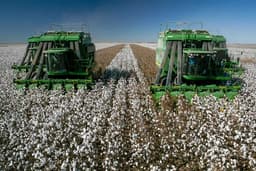Home / Environment / Climate Change Transforms Crops, Fueling Obesity and Nutrient Deficiencies
Climate Change Transforms Crops, Fueling Obesity and Nutrient Deficiencies
17 Nov
Summary
- Higher CO2 levels boost crop calories but decrease nutrients like protein, zinc, iron
- Rice and wheat, staple crops for billions, suffer significant nutrient declines
- Obesity rates expected to rise even with no change in diet or exercise

According to a recent study, the effects of climate change could be contributing to the global obesity epidemic. Scientists in the Netherlands have found that higher levels of carbon dioxide (CO2) in the atmosphere are causing a "pervasive elemental shift" across a wide range of popular edible plants, making them more caloric but less nutritious.
The researchers explain that the increase in CO2 boosts photosynthesis, producing more sugars and starches in crops. However, this surge in calories is accompanied by a decrease in the concentrations of essential nutrients like protein, zinc, and iron. On average, these key nutrients decline by 4.4%, with some decreasing by as much as 38%.
This trend is particularly concerning for staple crops like rice and wheat, which feed billions of people worldwide. The study warns that rice, the primary staple for over half the global population, and wheat, relied on by another 2.5 billion, are both suffering significant decreases in essential nutrients.
As a result, the researchers predict that even if food security remains adequate, "nutrient security is under threat." The calorie-dense but nutrient-poor crops could contribute to higher rates of obesity, weakened immunity, and more chronic diseases in humans. The team cautions that this "hidden hunger" could have "devastating health consequences" globally.
The study's findings are based on a meta-analysis of 43 different edible crops, including rice, barley, potatoes, and wheat, grown at varying CO2 levels. The researchers warn that the effects of rising greenhouse gas emissions are already being reflected in the ambient CO2 levels, which have increased from around 350 parts per million (ppm) in earlier experiments to 425 ppm today, with further increases expected in the coming decades.




